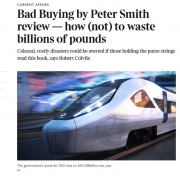Avoiding Bad Buying in UK Local Councils
As the results come in from local elections in England, it is clear that basically the country just wants the Conservative Party to go, the sooner the better. I don’t think there is huge enthusiasm for anyone else but most of the public are just sick of the infighting, incompetence and idiocy of the ruling party in recent years.
However, will changing our local councils make things better? A very interesting article in The Times looked at data provided by a new agency, the Office for Local Government (Oflog). Ministers set up Oflog last summer to provide “authoritative and accessible” performance data to support improvement in local government.
The data looks at the efficiency and effectiveness of local councils across 27 categories in five main areas: waste management, corporate and finance, adult social care, planning and roads. It revealed for example that some councils have recycling rates that are twice as good as others and that some authorities are failing to process half of planning applications on time, while others are not late on a single one. The figures also show the extent to which many councils are struggling with debts, with six local authorities already having declared themselves bankrupt since 2021. That is certainly in part becuase of lower funding from the centre of government, but competence (or lack of) seems to come into play too in most cases.
The Times accessed all the data to look at variations, which are huge and pretty inexplicable other than by sheer management competence. For example, in the year to September 2022, Hinckley & Bosworth borough council in the East Midlands completed less than half of household planning applications on time. But Tamworth borough council, just 30 miles away, was not late on any.
The Times also came up with league tables to see if there was any political correlation with performance. Nottingham (Labour controlled) was the worst performing authority. Torridge district council, on the north Devon coast, came top of the table – it is run by independent councillors.
But the results actually supported a theory I’ve held for years, suggesting it is not that the Conservatives (Tories) are generically better or worse than Labour in terms of competence (with the Lib Dems in the picture too in a smaller way). Of the ten worst-performing councils, six are controlled by Labour. Of the ten best-performing councils, six are in coalition or are run by independents, while the Liberal Democrats and the Conservatives run two each. Eight of the ten worst-performing county councils or rural unitary authorities are controlled by the Conservatives – while seven of the best-performing ten are in coalition or run by independents.
So what it does seem to show is that the worst-performing councils are almost always in areas, towns or cities where there has been a long-term dominant party, whether that is Labour or Tory. Conversely, the best-performing councils are generally more contested, so independents rule the roost, or no single party has a clear majority, or power has changed hands over recent years.
That stands to reason really. If there is a long-term dominant party, there is more scope for arrogance to creep into decision making, or fraud and corruption to spring up, and there is less scrutiny of decisions. “Bad buying”, whether it is just wasting money on frivolous or unnecessary spending, or more serious fraudulent or corrupt expenditure, is more likely where power is well entrenched. Take fraud for example. You are less likely to bribe a councillor, or to stand as a councillor yourself so you can influence planning decisions for nefarious purposes, if it is not clear who will be in charge after the next election.
Similarly, some of the arrogance we have seen in councils such as Woking, where the dominant Tory council invested hundreds of millions in unwise property deals, or in Nottingham, where the council (Labour in power since 1991, 50 of 55 councillors) thought it could run an energy firm better than the professionals, came about I’d suggest in part at least because the councillors thought they were unchallengeable and had complete power. My own council, Surrey Heath, has also lost money – not as much as Woking though – on property deals put in place by a very arrogant Tory leadership. But last year for the first time ever the Lib Dems took power here.
However, the correlation is far from perfect. Thurrock, where the council is now suing “businessman” Liam Kavanagh, who allegedly cheated the council out of over £100 million with dodgy solar farm investment schemes (hopefully the ex-finance head at the council will end up in court too), has actually had a few changes of council over the years.
But Liverpool is another example where single-party dominance led to a culture of corruption. Even after commissioners came in to run the City in 2021, the job description I saw for the Head of Procurement role still did not suggest a real appetite to put in place all the controls and governance you would want to see as a taxpayer!
Anyway, all this suggests that if your main interest as a voter is in the effective running of local services, rather than any deep political beliefs, you should aim to keep your local council and councillors on their toes by creating a competitive environment. How you can best do that will vary by area and even local electoral ward. But that seems the best strategy if you want your money to be used honestly and well.









Leave a Reply
Want to join the discussion?Feel free to contribute!